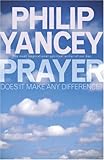 I thought it was about time I read a book by Philip Yancey, since most of his books end up as best-sellers and this one won various awards. The subject was also of interest – probably like most Christians, prayer is something I feel that I need to get much better at. Its quite a sizable book for a paperback, running to over 300 pages. You can tell why he is such a popular author. He is a good storyteller and has an easy to read style.
I thought it was about time I read a book by Philip Yancey, since most of his books end up as best-sellers and this one won various awards. The subject was also of interest – probably like most Christians, prayer is something I feel that I need to get much better at. Its quite a sizable book for a paperback, running to over 300 pages. You can tell why he is such a popular author. He is a good storyteller and has an easy to read style.
The way he tackles the subject is interesting. Its not really a how-to manual, although it does offer a few useful suggestions, and unlike many books on prayer, its not written to convince you that prayer unleashes power so you ought to get on with it. Instead, Yancey takes a more philosophical approach, trying to understand what the point of prayer is, and tackling some of the difficult questions we have about it.
While he believes that God does answer prayer, Yancey is painfully aware of many who have not seen their prayers answered. He tackles these problems head on, with great honesty about his own struggles to understand the subject, especially living as we do in a skeptical society. He notes that many in the Bible, including Jesus himself, prayed prayers that we might say were “unanswered”.
In a chapter asking whether prayer changes God, you can tell he is not from a Reformed persuasion, preferring to emphasise God’s concern for human free will rather than his sovereign control over all things. He does stress the importance of prayer changing us, and drawing us closer to God, getting his perspective rather than merely being about getting the things we ask for.
The main purpose of prayer is not to make life easier, nor to gain magical powers, but to know God. I need God more than anything I might get from God.
He finds the ultimate answer to the question “why pray?” simply in the fact that Jesus did it. Prayer is a means of getting God’s will done on earth, not ours. Rather than simply challenging us to have more faith and be more persistent (though he does encourage that), Yancey encourages us to reflect more deeply on why some prayers seem to go unanswered.
Sometimes, like the boy who asks his parents to solve a maths problem while he plays video games, we ask God for the things we should be doing ourselves.
I don’t think I would recommend this as the first, or only book someone should read on prayer, and yet I think its value is in his willingness to talk about the things that many who tackle prayer leave unsaid, or rush past very quickly.
Perhaps its most timely contribution may be to provide some balance on the subject of prayer for healing. While some will consider his approach to be lacking in “faith”, the reality is that even those who pray regularly and with great faith for healing do not see complete success. It is a book that doesn’t promise instant results or insist upon certain styles or techniques, but will leave you with a richer understanding of the value and mystery of prayer, and hopefully also will encourage you to grow in your own practice of prayer.

wow Praise God,,,,,,,,,,,,the Spirit of God moves to the life of Philip Yancey. I’m so blessed though I didn’t read already his book that he wrote.TO GOD BE THE GLORY